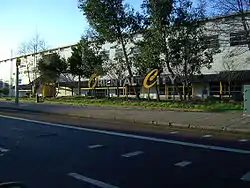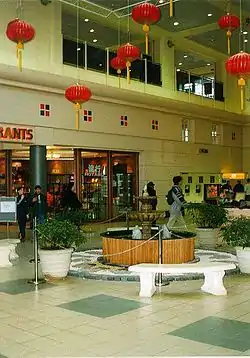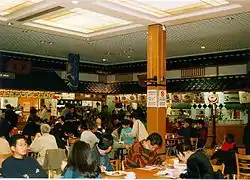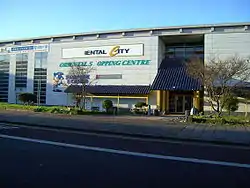Oriental City
Oriental City was a major shopping centre in Colindale, North London, England, originally built as a luxury Japanese shopping centre called Yaohan Plaza by the Yaohan retail company of Japan. After Yaohan filed for bankruptcy in the late 1990s, the centre became a lower-end mall specialising in various oriental foods and items, while also containing health and social services for the East Asian community. Opening in 1993, the 141,000 sq ft complex was located on Edgware Road with a dedicated car park and two floors.[1]


Referred to as London's "real Chinatown", Oriental City received about 10,000 visitors weekly as of 2006.[2] The complex was closed for redevelopment on 1 June 2008 and, after several changes of ownership, was demolished in August 2014. In July 2017 the smaller Bang Bang Oriental Food Hall opened on the site, comprising 32 food kiosks, massage and beauty therapy suites as well as shops and a cultural centre.[3]
Yaohan Plaza
Yaohan Plaza was built as a Yaohan Shopping Centre, where it operated as a high-end Japanese shopping centre. The large complex was built with a Japanese style roof and contained a large Yaohan at its centre surrounded by smaller Oriental kiosks. It also contained a Sega Dome (later Sega Park) arcade centre;[4] the arcade's outer façade was highly noticeable for the large picture of Sonic the Hedgehog attached to it. The original Yaohan Plaza also featured a small example of a traditional Japanese garden outside the centre, which was allowed to fall into disrepair after the change of ownership.
After the Yaohan Corporation filed for bankruptcy in the late 1990s, it was sold to Malaysian owners, which was when it was renamed Oriental City. Many locals and visitors still continued to refer to it as Yaohan Plaza.
Oriental City

After the centre was bought by Malaysian owners, it contained a large oriental supermarket, now relocated to Bayswater, and a food court with a range of foods from different areas of South-East Asia; stalls offered Malaysian, Thai, Vietnamese, Chinese, Korean and Japanese foods including bento boxes and sushi, ramen noodles, and assorted Asian desserts. The food court was immensely popular with surrounding office workers and the North London community; and often became very crowded at weekends.
The food court was complemented by a number of oriental restaurants in the complex, with the majority of them located on the upper floor. The complex contained two Dim Sum restaurants, a Szechuan restaurant, and an 'all you can eat' restaurant. Outside, there was a durian stall and a satay stall.
Aside from the food outlets, the complex also contained a number of small shops and stalls. Over its history there was a high turnover of shops, with only one remaining original tenant in the facility, the Japanese tableware store, Utsuwa-No-Yataka. The centre also previously housed a shop selling video games and toys imported from Japan, a Sanrio boutique, and one of the largest Japanese bookshops in Europe, called Asahiya Shoten. These have been closed down since 2003. In the period shortly before the centre closed down, shoppers could find a tailor's shop, a jeweller, a hairdresser, a beauty shop, Chinese medicine shops, a martial arts store, a large furniture store, and visit the Sega Park arcade.
The centre was a focal point for the Oriental community, often hosting weeks which promoted the cultural identity of different South East Asian countries. These events typically consisted of various performing arts, and the promotion of that country's particular cuisine.
Proposed redevelopment and closure

In November 2006, Oriental City was bought out by the developer Development Securities who planned to demolish the centre and replace it with a B&Q, a housing development and a primary school. This private business transaction was beset by delays from store owners, the East Asian community, petitions, and even interference by the Chinese Consul-General and an ex-Arsenal football player. The developer was not able to close the complex until 2008, by which time the Great Recession had soured their ability to proceed with the redevelopment.
In 2006, the developers stated that there would be provisions for the current tenants of Oriental City to continue in the new development; however, the tenants objected to this, owing to the lack of consultation. Tenants stated that the new complex would take up to 9 years to complete, contrary to Development Securities' claim that redevelopment would take 3 years. Most tenants did not believe they could survive even a temporary relocation of their businesses.[5]
Aside from business considerations, the East Asian community feared any redevelopment would mean the loss of an important community focal point. The tenants shut their businesses for a day to protest to the council at Brent Town Hall on 21 November 2006 feeling that they had been treated like 'second class citizens'.[6] The tenants' plight was backed by a long-time visitor of the Centre, ex-Arsenal football player Ian Wright, who met the then London Mayor Ken Livingstone's planning officials in early December 2006 to object to the redevelopment plans.[7]
In February 2007, the Chinese Consul-General wrote to London's mayor to express his "deep concern" about the project, calling for the proposal to be modified.[8] Following a petition, it was announced that Oriental City would remain open until at least May 2008. The centre closed permanently at 7:00 pm on Sunday 1 June 2008, with thousands of people flocking to see Oriental City for the last time on its final day.
On 31 July 2008 Development Securities sold the site to a new developer, B & S Homes, for £68 million. The purchasers paid a £16 million deposit but were unable to find the £52 million required to complete their purchase. Their deposit was lost, the building went back into the hands of Development Securities, and further progress in the prevailing economic climate looked unlikely. As a result, the building remained boarded up and derelict.[9]
From early 2009, there was much talk amongst former tenants of a proposal to reopen the doors of Oriental City in its previous form later that year. Discussions were understood to be taking place between the owners and former tenants. In February 2010, former tenants of Oriental City held a protest at the site over the continued closure of the centre. A campaign to re-open the centre was initiated, and it was reported that Morrisons was interested in developing the site.[10]
In May 2013, planning permission was granted for a full redevelopment of the site by Development Securities with Morrisons as an anchor tenant.[11] In August 2014 the Oriental City building was demolished, and a new development including flats and a Morrisons Superstore was built on the location, the store opening in March 2016. Brent Council reserved the remaining part of the retail site for "Far Eastern and Oriental uses" only, incorporating 30,000 sq ft of restaurant space.[12] This was later allocated to the Bang Bang Oriental Food Hall.
In TV and film
The centre was used as an abandoned mall in the BBC One series Luther. It appeared in the 2012 film Dredd, where it was restored to a semblance of its former glory with a Blade Runner-like makeover. It was used in the first episode of the 2011 BBC Three series The Fades. Oriental City was the single location used for the 2012 TV film of a Royal Shakespeare Company production of Julius Caesar, directed by Gregory Doran.[13] The complex appeared in 2013 during a first season episode of the BBC Two series Charlie Brooker's Weekly Wipe, with Brooker wandering around various parts of the derelict car park, Zen Tian Di Chinese buffet and a set of escalators. The centre was also used for the music video Bittersweet Memories by Welsh metalcore band Bullet For My Valentine.[14]
See also
- Japanese community of London
- Pacific Plaza, a similar complex in Wembley Retail Park that traded from December 2009 to April 2011
- Chinatown
- Wing Yip
- Loon Fung
- Japan Centre in London's Regent Street
- British Chinese
References
- https://www.independent.co.uk/news/business/japan-finds-a-place-in-the-suburbs-north-london-is-facing-the-culture-shock-of-a-retail-village-for-1494291.html
- http://news.bbc.co.uk/1/hi/england/london/6158376.stm
- http://www.bangbangoriental.com/
- https://www.independent.co.uk/news/business/japan-finds-a-place-in-the-suburbs-north-london-is-facing-the-culture-shock-of-a-retail-village-for-1494291.html
- 'Asian traders protest over plans to demolish "Oriental City"', The Independent, 17 November 2006 Archived 2 January 2007 at the Wayback Machine (accessed 19 November 2006)
- 'Campaign to save "'real Chinatown'"', BBC News, 17 November 2006 (accessed 19 November 2006)
- 'Wright backs Oriental City fight', BBC News, 4 December 2006 (accessed 6 December 2006)
- 'Beijing enters Oriental City row', BBC News, 8 February 2007 (accessed 8 February 2007)
- ‘Oriental City deal collapses’, Property Week, 31 March 2009 (accessed 19 August 2009)
- (Kilburn Times, 1 March 2012)
- "Archived copy". Archived from the original on 13 February 2016. Retrieved 8 February 2016.CS1 maint: archived copy as title (link)
- http://www.illuminationsmedia.co.uk/tis-time-to-part-days-11-12/
- https://www.youtube.com/watch?v=5cW_BuQqzGs
External links
| Wikimedia Commons has media related to Oriental City. |
- Video of Oriental City Food Court taken 25.05.08
- Flickr group for photos and videos of Oriental City
- Route79's Flickr pictures of Oriental City
- 'Oriental City Agreement Reached', dimsum.co.uk
- 'Oriental City protest', dimsum.co.uk
- "Anger over continued closure of 'real Chinatown'" BBC article, February 2010
- "End of the road for 'real Chinatown'?", BBC article
- London Randomness Guide to Oriental City
- Early Look at [[Pacific Plaza, willeatformoney.blogspot.com]
- Campaign & petition to re-open Oriental City
- https://web.archive.org/web/20110216090458/http://www.yell.com/reviews/oriental+city+supermarket-1g16x8a-r